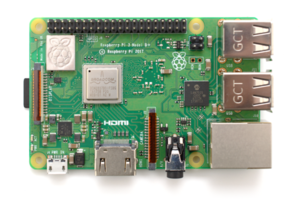Raspberry Pi (nonfiction): Difference between revisions
Jump to navigation
Jump to search
No edit summary |
No edit summary |
||
| Line 25: | Line 25: | ||
* [https://en.wikipedia.org/wiki/Raspberry_Pi Raspberry Pi] @ Wikipedia | * [https://en.wikipedia.org/wiki/Raspberry_Pi Raspberry Pi] @ Wikipedia | ||
* [https://hardware.slashdot.org/story/17/05/04/208240/google-releases-diy-open-source-raspberry-pi-voice-kit-hardware Google Releases DIY Open Source Raspberry Pi Voice Kit Hardware] @ Slashdot | * [https://hardware.slashdot.org/story/17/05/04/208240/google-releases-diy-open-source-raspberry-pi-voice-kit-hardware Google Releases DIY Open Source Raspberry Pi Voice Kit Hardware] @ Slashdot | ||
* [https://boingboing.net/2019/03/24/kickstart-your-mad-science-wit.html Kickstart your mad science with this Raspbery Pi boot camp] @ Boing Boing | |||
[[Category:Nonfiction (nonfiction)]] | [[Category:Nonfiction (nonfiction)]] | ||
[[Category:Computers (nonfiction)]] | [[Category:Computers (nonfiction)]] | ||
[[Category:Machines (nonfiction)]] | [[Category:Machines (nonfiction)]] | ||
Revision as of 06:24, 25 March 2019
The Raspberry Pi is a series of small single-board computers developed in the United Kingdom by the Raspberry Pi Foundation to promote the teaching of basic computer science in schools and in developing countries.
The original model became far more popular than anticipated, selling outside of its target market for uses such as robotics.
Peripherals (including keyboards, mice and cases) are not included with the Raspberry Pi. Some accessories however have been included in several official and unofficial bundles.
According to the Raspberry Pi Foundation, over 5 million Raspberry Pis have been sold before February 2015, making it the best-selling British computer. By November 2016 they had sold 11 million units.
In the News
Fiction cross-reference
Nonfiction cross-reference
External links:
- Raspberry Pi @ Wikipedia
- Google Releases DIY Open Source Raspberry Pi Voice Kit Hardware @ Slashdot
- Kickstart your mad science with this Raspbery Pi boot camp @ Boing Boing
